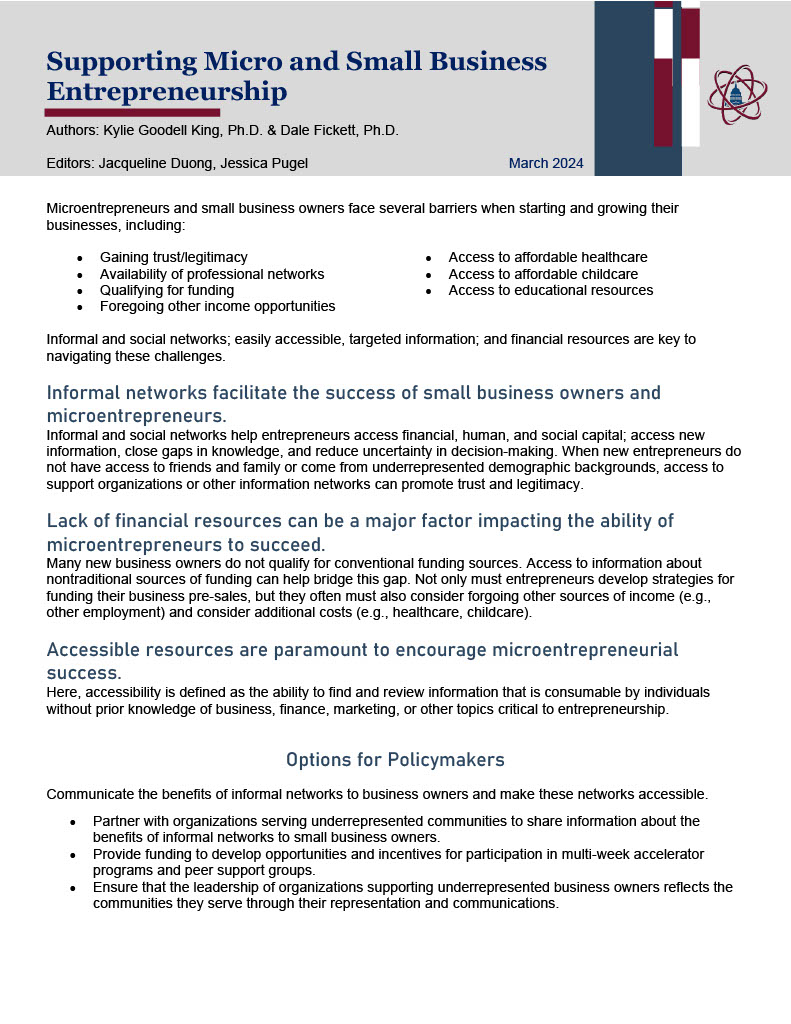
Microentrepreneurs and small business owners face several barriers when starting and growing their businesses, including:
- Gaining trust/legitimacy
- Availability of professional networks
- Qualifying for funding
- Foregoing other income opportunities
- Access to affordable healthcare
- Access to affordable childcare
- Access to educational resources
Informal and social networks; easily accessible, targeted information; and financial resources are key to navigating these challenges.
Informal networks facilitate the success of small business owners and microentrepreneurs.
Informal and social networks help entrepreneurs access financial, human, and social capital; access new information, close gaps in knowledge, and reduce uncertainty in decision-making. When new entrepreneurs do not have access to friends and family or come from underrepresented demographic backgrounds, access to support organizations or other information networks can promote trust and legitimacy.
Lack of financial resources can be a major factor impacting the ability of microentrepreneurs to succeed.
Many new business owners do not qualify for conventional funding sources. Access to information about nontraditional sources of funding can help bridge this gap. Not only must entrepreneurs develop strategies for funding their business pre-sales, but they often must also consider forgoing other sources of income (e.g., other employment) and consider additional costs (e.g., healthcare, childcare).
Accessible resources are paramount to encourage microentrepreneurial success.
Here, accessibility is defined as the ability to find and review information that is consumable by individuals without prior knowledge of business, finance, marketing, or other topics critical to entrepreneurship.
Options for Policymakers
Communicate the benefits of informal networks to business owners and make these networks accessible.
- Partner with organizations serving underrepresented communities to share information about the benefits of informal networks to small business owners.
- Provide funding to develop opportunities and incentives for participation in multi-week accelerator programs and peer support groups.
- Ensure that the leadership of organizations supporting underrepresented business owners reflects the communities they serve through their representation and communications.
Support the development of accessible resources to support early-stage entrepreneurs.
- Prioritize online platforms for information dissemination.
- Collaborate with educators and support organizations and conduct user testing to ensure content is streamlined, appropriate for diverse audiences, and inclusive.
- Provide guidance on securing financial support, focusing on nontraditional funding avenues.
Fund nonprofit finance & credit education for under-resourced founders.
Strategize financial support access.
- Support microloan securitization.
- Expand community development finance within commercial banks.
- Promote government matching and loan guarantees to incentivize impact investments.
- Provide incentives for first-time business owners.
The Research-to-Policy Collaboration (RPC) works to bring together research professionals and public officials to support evidence-based policy. Please visit their website to learn more.
Key Information
RPC Website
Research-to-Policy Collaboration
More RPC Resources
RPC Resources
Publication DateApril 9, 2024
Topic Area(s)Economy and Entrepreneurship
Resource TypeWritten Briefs
Share This Page
Microentrepreneurs and small business owners face several barriers when starting and growing their businesses, including:
- Gaining trust/legitimacy
- Availability of professional networks
- Qualifying for funding
- Foregoing other income opportunities
- Access to affordable healthcare
- Access to affordable childcare
- Access to educational resources
Informal and social networks; easily accessible, targeted information; and financial resources are key to navigating these challenges.
Informal networks facilitate the success of small business owners and microentrepreneurs.
Informal and social networks help entrepreneurs access financial, human, and social capital; access new information, close gaps in knowledge, and reduce uncertainty in decision-making. When new entrepreneurs do not have access to friends and family or come from underrepresented demographic backgrounds, access to support organizations or other information networks can promote trust and legitimacy.
Lack of financial resources can be a major factor impacting the ability of microentrepreneurs to succeed.
Many new business owners do not qualify for conventional funding sources. Access to information about nontraditional sources of funding can help bridge this gap. Not only must entrepreneurs develop strategies for funding their business pre-sales, but they often must also consider forgoing other sources of income (e.g., other employment) and consider additional costs (e.g., healthcare, childcare).
Accessible resources are paramount to encourage microentrepreneurial success.
Here, accessibility is defined as the ability to find and review information that is consumable by individuals without prior knowledge of business, finance, marketing, or other topics critical to entrepreneurship.
Options for Policymakers
Communicate the benefits of informal networks to business owners and make these networks accessible.
- Partner with organizations serving underrepresented communities to share information about the benefits of informal networks to small business owners.
- Provide funding to develop opportunities and incentives for participation in multi-week accelerator programs and peer support groups.
- Ensure that the leadership of organizations supporting underrepresented business owners reflects the communities they serve through their representation and communications.
Support the development of accessible resources to support early-stage entrepreneurs.
- Prioritize online platforms for information dissemination.
- Collaborate with educators and support organizations and conduct user testing to ensure content is streamlined, appropriate for diverse audiences, and inclusive.
- Provide guidance on securing financial support, focusing on nontraditional funding avenues.
Fund nonprofit finance & credit education for under-resourced founders.
Strategize financial support access.
- Support microloan securitization.
- Expand community development finance within commercial banks.
- Promote government matching and loan guarantees to incentivize impact investments.
- Provide incentives for first-time business owners.
The Research-to-Policy Collaboration (RPC) works to bring together research professionals and public officials to support evidence-based policy. Please visit their website to learn more.

Key Information
RPC Website
Research-to-Policy Collaboration
More RPC Resources
RPC Resources
Publication DateApril 9, 2024
Topic Area(s)Economy and Entrepreneurship
Resource TypeWritten Briefs
Share This Page
LET’S STAY IN TOUCH
Join the Evidence-to-Impact Mailing List
Keep up to date with the latest resources, events, and news from the EIC.




